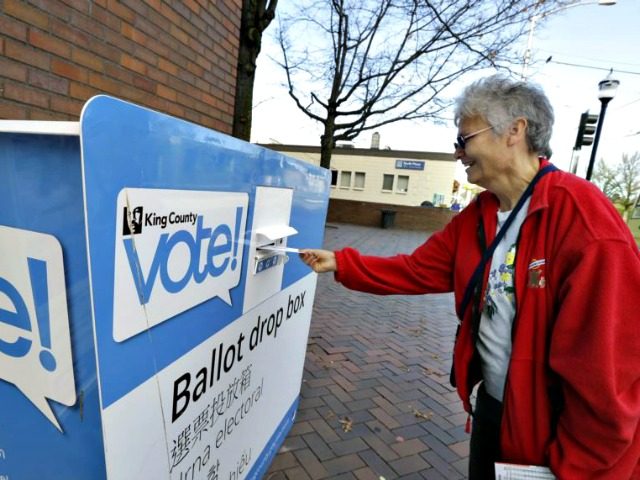While it’s clear that Donald Trump will be the 45th president of the United States, it wasn’t clear until Thursday that he carried Arizona. A quarter of Arizona’s vote has not been counted a full day after the election because of mail-in voting, a fraud-prone practice that disserves the nation and should end.
It’s not uncommon after Election Day to have a state or two where the result is not announced for three or so days after the polls close. Out of 50 states, a couple might be within a percentage point or even a fraction of a point, requiring a detailed count of lagging absentee ballots (often from military voters overseas where it can take longer to arrive and be counted), sometimes resulting in recounts or court challenges. (Think Bush v. Gore in 2000.)
But as of Wednesday night, why had Arizona not been called? Donald Trump was leading Hillary Clinton by 4.3 percent—49.6 to 45.3. Multiple states with closer margins were called for either Trump or Clinton on election night.
Arizona has not, because 24 hours after the polls had closed, fully 25 percent of the vote—one quarter of all votes cast in the Grand Canyon State—had not yet been counted.
That’s due to mail-in voting. Roughly half of the votes cast in Arizona—1.7 million—were filled out at home and mailed in before Election Day. Arizona was finally called for President-elect Trump on Thursday, but had the margin been closer, we might not have known until the weekend.
The principal newspaper in Phoenix—the liberal-leaning Arizona Republic—lamented that since the election is over, knowing who carried Arizona this late in the game is just “academic.”
The process of mail-in voting is wrought with potential for fraud and abuse. No election worker actually witnesses a voter filling out their ballot; they arrive at election collection centers as over a million faceless envelopes, with signatures and other fake-able “verification” measures.
Mail-in voting is also fraught with potential for voter intimidation. Groups can acquire lists of people who receive mail-in ballots. Until Arizona passed a law this year, anyone—including shady leftist groups—could send a team of three or four workers to “help” you vote, and then collect those ballots themselves. Nothing keeps them from standing over a voter in the living room while the ballot is filled out, or (if a person is not intimidated by the observers’ presence and votes for a conservative Republican despite the pressure), after the ballot is “collected,” it could end up in the dumpster instead of the county’s election office.
The U.S. Court of Appeals for the Ninth Circuit held that this law is unconstitutional (over eloquent dissents by conservative judges), in a case that is still ongoing and faces an uncertain fate before the current Supreme Court.
Another problem with mail-in voting is that it’s often done as early voting. In Arizona, there’s Election Month, not Election Day. Ballots go out and citizens can often vote before they’ve seen two of the three presidential debates, and also before the vice presidential debate.
Campaigns are conversation with the candidates, during which time the nominees make their case to the voters, debate each other, respond to criticism, and investigators—including from the media, when they bother to do their job—uncover a lifetime of foibles and missteps (of which everyone has some).
All this is laid before the voters, who have time to process the information, talk with each other, ask tough follow-up questions, and weigh the answers. At the end of that conversation and vetting, an informed electorate can choose the most powerful person in the world, as well as over 8,000 other elected offices at various levels of government.
Except in states like Arizona, where fully one-third of early votes are cast by mail within 96 hours of those ballots showing up in mailboxes in early October. People are voting when this examination process is nowhere near complete.
Think of all that was learned about both President-elect Trump and Secretary Clinton during that last month. Think also of the news developments, like the horrific premium increases in Obamacare. Voters have a right to know all that and contemplate what these revelations mean before choosing who will lead them.
This is the “rigged system” the president-elect denounced during the campaign. The right to cast a vote is accompanied by a right not to have your lawful ballot canceled out or diluted by an illegal, fraudulent, or corrupted ballot.
While there must always be absentee procedures for people who are not able to vote on Election Day, that should be the exception, not the rule. And the law should start the process as late as possible so that voters can learn through as much of the campaign as possible before casting their ballot.
Along with laws requiring voter ID and proof of citizenship (because foreigners can get drivers licenses in every state, and even illegal aliens can get them in some states), these measures can provide much-needed reforms to ensure that every citizen’s lawful vote is cast and counted.
Fundamental election law reform is needed to safeguard the integrity of the ballot box and ensure an informed electorate. President Trump will have an opportunity to decide if he wants to tackle that issue to clean up future elections.
Ken Klukowski is senior legal editor for Breitbart News. Follow him on Twitter @kenklukowski.

COMMENTS
Please let us know if you're having issues with commenting.